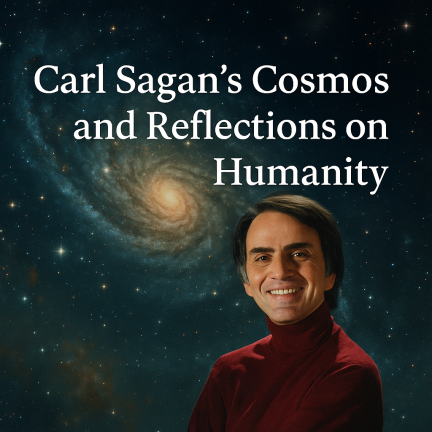When Carl Sagan published Cosmos in the early 1980s, he didn’t just write a science book—he offered humanity a philosophical mirror through the lens of the universe. As an astronomer, astrophysicist, and science communicator, Sagan translated the immense complexities of the cosmos into poetic, accessible language. Through this, he encouraged a deeper understanding not only of space but also of ourselves. In this post, we explore the key humanistic themes of Cosmos, and how Sagan’s reflections continue to resonate in today’s world.
1. How Small Are We in the Vastness of Space?
Sagan famously described Earth as a “pale blue dot,” a phrase that later became the title of one of his most profound works. But the seeds of this reflection were sown in Cosmos. With over 100 billion galaxies, each containing billions of stars and potentially even more planets, the universe reveals how infinitesimal Earth—and by extension, we—really are.
Yet, Sagan didn’t see this smallness as diminishing. On the contrary, he believed our humility in the face of cosmic scale is a necessary counter to human arrogance. Recognizing our place in the grand scheme fosters a deeper respect for the fragility of life and the uniqueness of our planet.
2. Science as a Way of Thinking, Not Just Knowing
For Sagan, science was more than a body of knowledge—it was a method of thought. He championed skepticism, empirical evidence, and rational inquiry. In Cosmos, he emphasized that no idea, no matter how beautiful or compelling, should be immune to questioning or testing.
He likened science to democracy: a system where ideas compete freely, the best survive scrutiny, and consensus is built through shared evidence. Sagan warned that abandoning scientific thinking risks societal decay, as superstition, dogma, and authoritarianism fill the void. Science, in his view, is both a personal discipline and a collective safeguard.
3. We Are Made of Starstuff
One of Cosmos’s most iconic statements is: “We are made of starstuff.” Sagan traced the origins of human elements—carbon, nitrogen, oxygen—back to ancient stars whose explosions seeded the cosmos with the ingredients for life.
This insight transforms science into philosophy. Humans are not apart from nature; we are woven into the cosmic fabric. Our molecules once belonged to stars, and one day will return to them. This poetic truth bridges science and spirituality, inviting awe and responsibility in equal measure.
4. Warnings and Hopes for Civilization
Sagan used Cosmos not only to share knowledge but to issue urgent warnings. He spoke against nuclear proliferation, environmental destruction, and the neglect of scientific literacy. He feared that humanity, if reckless, could destroy itself with the very tools its intelligence had created.
Yet, Cosmos is also a book of hope. Sagan believed that through scientific understanding and shared wonder, humanity could rise above tribalism and conflict. He envisioned a civilization that looks to the stars not for conquest, but for cooperation and exploration. The future, he argued, is in our hands.
5. Cosmos Is a Story of Us
Though it’s filled with astrophysics and chemistry, Cosmos is, at heart, a story about being human. It chronicles how our ancestors first looked up and asked questions, and how those questions led to myths, then philosophy, then science. It connects the scientific journey to culture, art, and ethics.
Sagan didn’t draw a line between science and the humanities; he saw them as parts of the same quest. Understanding the universe helps us understand ourselves, our origins, and our potential.
Conclusion: Rediscovering Ourselves Through the Cosmos
Cosmos is not just a science book—it is a love letter to existence. Carl Sagan invites us to see beyond borders, egos, and time, and to reconnect with the larger story of the universe. In an era of rapid technological change and ecological crisis, Sagan’s message remains vital.
Science does not shrink the human spirit; it elevates it. By embracing the cosmic perspective, we find not despair in our smallness, but purpose in our awareness. Cosmos teaches that to know the universe is to cherish life, and to cherish life is the first step toward a better future.
